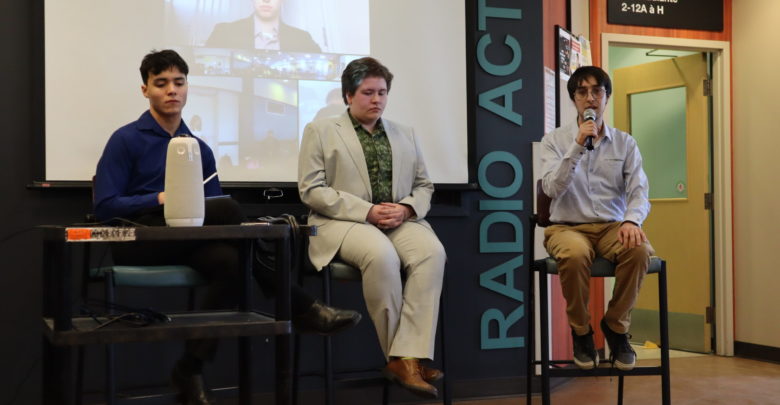 Arthur Macatangay
Arthur MacatangayAt the Campus Saint-Jean (CSJ) forum, all three vice-president (academic) (VPA) candidates spoke with conviction about how their platforms would address the concerns of CSJ students.
However, while candidates claim that their approaches are rooted in consultation, they pose generic solutions to the same issues CSJ has raised in student elections for years. Additionally, when candidates had the opportunity to ask one another questions, their strategy seemed to be who could mention CSJ the most number of times in their statements — rather than actionable goals for CSJ.
As VPA, student advocacy for equitable access to academic supports is practically a part of the job description.
In Milan Regmi’s opening statement, delivered in French to the best of his ability, he spoke about advocating for academic transparency and accessibility for CSJ students. His appeal felt like a lacklustre reiteration of what VPA is supposed to do. It lacked any mention of innovative approaches to removing the language barriers to accessing academic resources, such as BearTracks and eClass.
Rowan Morris referred to the frustration brought on by the lack of French representation — having most academic services exclusively offered in English — as being a product of the Students’ Union’s (SU) “empty promises.” In the forum, Morris spoke to re-introducing the Student Representative Association (SRA) summit and mentorship program. While interesting, Morris didn’t refer to how he would make “bilingual BearTracks” a reality as mentioned on his platform, which was a missed opportunity at CSJ.
In contrast to Morris criticizing the commitments to CSJ, Pedro Almeida pledged to continue the work put forward by the SU and the Association des Universitaires de la Faculté Saint-Jean (AUFSJ). Additionally, he proposed a bilingual academic advising hub that would “minimize confusion for students at CSJ who are taking classes on North Campus.”
On the surface, this idea sounds appealing. However, Almeida didn’t address exactly how he would fulfill this promise — which is concerning given that the U of A doesn’t even have the resources to provide enough advisors in one language, never mind two.
Interestingly, Almeida was questioned by Morris during the candidate’s question period for not including CSJ in his platform at all. Almeida responded saying that neither is Augustana or North Campus, and that this is due to the fact that they are all a part of the same university, inferring that all of his platform goals could apply to each campus. His rationale for grouping each campus together in his promised goals is a risky approach to academic advocacy for the U of A’s different campuses.
When it comes to the advocacy of minorities on campus, I am not convinced that Almeida’s approach of grouping campuses together will help fulfill the specific needs of CSJ students. To put enrolment numbers into perspective, folding the voices of approximately 800 CSJ students with those of the staggering 35,000 North Campus students, poses the threat of minimizing their specific concerns — many of which have been unresolved, despite recurrent VPA campaigns and promises.
Morris was also asked by Regmi why he had only one mention of CSJ in his platform, which was discussing translation for the SRA summit. Afterwards, Almeida raised that Regmi may be promising too much, with many mentions of CSJ but not many details on how things would be achieved.
I know I’m not the only student that felt that this back-and-forth was a missed opportunity to discuss fresh solutions to the real issues CSJ faces. Advocating for the academic needs of students shouldn’t be measured by how many goals a candidate’s platform has, but rather by how actionable those goals are.
While all VPA candidates may offer their platforms in French, their advocacy goals don’t provide concrete objectives as to how they will resolve language and academic support barriers to CSJ students. This attempt at inclusivity just comes across as performative without a clear plan.
It seems obvious that translation resources and collaboration with other executives and associations are necessary to make platform promises a reality. However, what makes those promises any different from former races that haven’t met these proposed goals?
Candidates shouldn’t be afraid to admit what has failed, and why strides toward closing the bilingualism gap haven’t been fulfilled. Specifically, candidates should be explaining how their proposals will acutely target these issues. Student voters will be paying attention to their unique and inventive approaches, which will differentiate one candidate from another.
With all three candidates lacking actionable specifics, they need to work harder at differentiating themselves from each other, especially in their advocacy.
Although the Campus Saint-Jean forum was a failed hard-launch for VPA candidate platforms, there is still time for these candidates to improve before voting begins on March 8.
Every year, The Gateway publishes hundreds of articles like the one you just read that are free for everyone to access. But The Gateway needs your support to continue publishing its award-winning journalism. Please consider donating today, even a small amount can help the University of Alberta’s only newspaper continue serving the campus community. Thank you.




